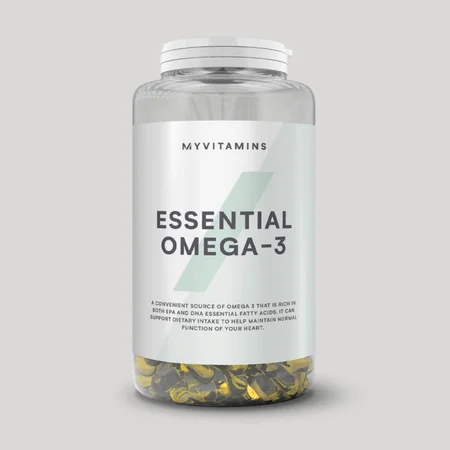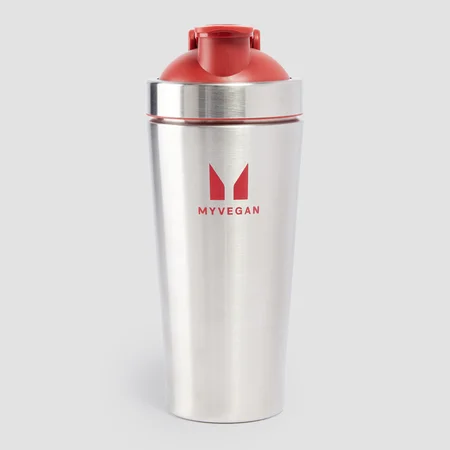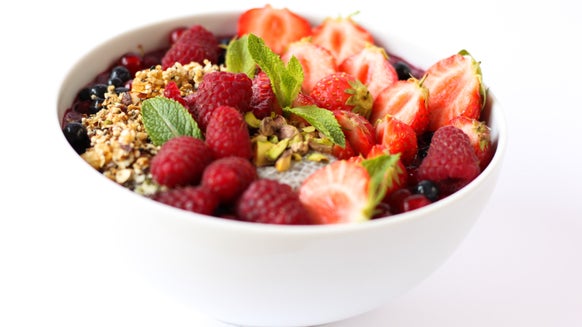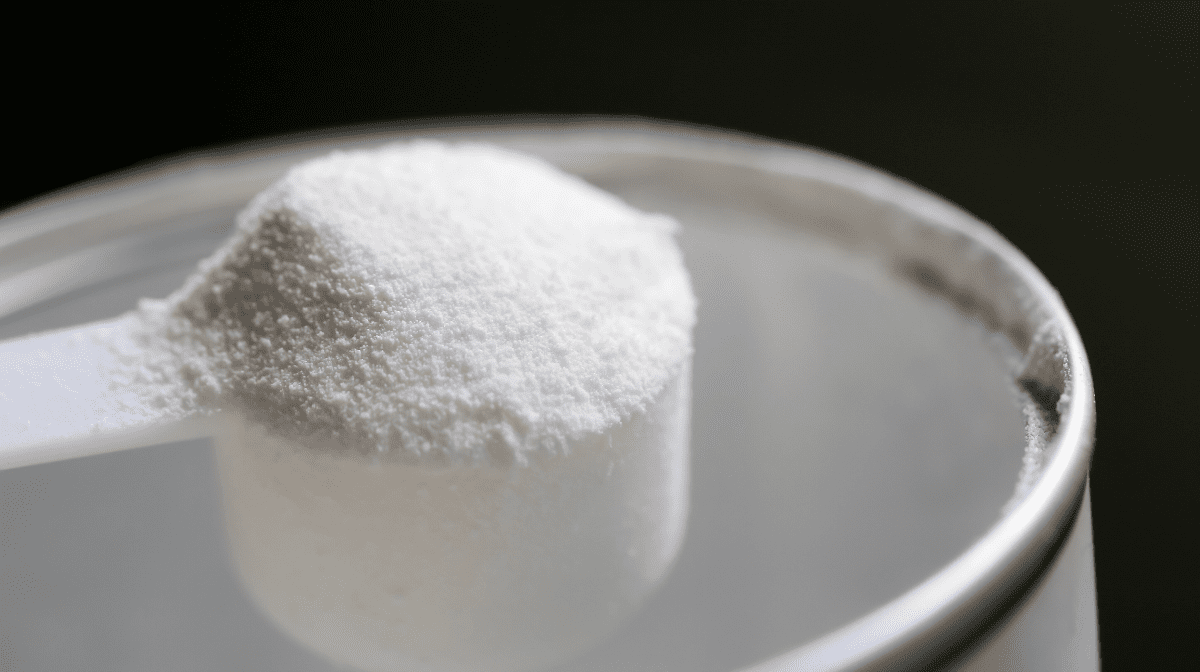
Collagen protein powder is a popular supplement that people use in many different ways. While it’s considered a protein powder just like whey or soy, it functions differently in the body and has different benefits.
It’s been available for years in the form of gelatin, but more recently collagen protein has exploded in popularity. Here’s why collagen protein can be so useful.
Jump to:
- What is collagen protein?
- How does collagen protein work?
- What does collagen do?
- Sources of collagen
- What are the benefits of collagen protein?
- Collagen side effects
- Collagen foods
- The best way to take collagen protein
What is Collagen Protein?
Collagen protein is the most abundant protein in the human body, making up almost a third of the body’s total protein content.
Our bodies can make collagen on their own, but getting extra through your diet or supplements can provide additional benefits. The most common form of collagen supplement is hydrolyzed collagen.
How does collagen protein work?
Collagen actually works quite differently from whey or soy protein supplements. Because our body makes its own collagen, it maintains the balance of collagen being broken down and produced based on the presence of the amino acids, or building blocks, in our system.
When collagen is broken down into its building blocks, the body thinks it needs to produce more. Taking hydrolyzed collagen as a supplement makes the body think it’s detecting a break down in collagen levels, and causes it to produce even more.2
What does collagen do?
There are actually more than 10 different forms of collagen proteins, but there are four primary types that play key roles in the body.
Type 1 Collagen
This type makes up most of the collagen in the human body, up to 90%, and is the dense type that provides structure to several body components — like teeth, skin, bone, and cartilage.3
Type 2 Collagen
This type of collagen is more elastic and stretchy, less densely packed than type 1, and is primarily found providing cushioning to your joints.3
Type 3 Collagen
Type 3 collagen’s role is to provide structure to your arteries, organs, and muscles. It’s often combined with Type 1 to enhance skin, hair, and nail health.3
Type 4 Collagen
Type 4 collagen is crucial in skin health and helps to provide a filter between the outside environment and your body.3
Sources of collagen
Because collagen is a naturally occurring protein, most supplements are sourced from animal sources — like cows, pigs, and fish. The supplements can come in different forms but hydrolyzed (or partially broken down) collagen seems to have the greatest benefit. You may be familiar with gelatin, which is a less processed form of collagen that’s often used in cooking.
Collagen Powder / Collagen Protein
Collagen protein powder is likely the most widely available form of collagen on the market. It’s typically found in the hydrolyzed — or broken down — form, making it the easiest for the body to absorb.9 It shows the most success in research studies and it mixes easily into beverages and can be added to your post-workout shake or taken on its own. Research supports that it improves muscle health like other protein sources.11
Beverages
Collagen “shots”, or drinks, are another popular form of the supplement. They have the collagen already dissolved in a liquid that you can easily take on its own. The benefits of these supplements depend on the types of collagen included — as noted above, types 1-4 are the most beneficial. However, they can be pricey and often require refrigeration, making them more difficult to use on the go.
Bone Broth
Bone broths are another popular way people get collagen in their diets. Although not a true supplement since these are more of a soup, they naturally contain high levels of collagen. They have become popular in recent years and can be found in many grocery stores. They are also easy to make at home.
Topical Cream
Topical creams designed to help improve skin elasticity and have anti-aging effects are widely available. The thought is that these work by increasing the amount of collagen in the skin where they’re applied. Research shows that consistent use of topical collagen products can increase hydration and elasticity of skin over time.12
| Collagen Supplement | Benefit | Considerations |
| Powder | Easy to add to drinks and foods, easily digested, often targets muscle growth | May not be suitable for vegans/vegetarians, note which types are included |
| Beverages | Convenient | Can be expensive, note which types of collagen are included |
| Bone Broth | Natural source of collagen, widely available, can make at home | Can be high in salt, hard to know collagen levels |
| Topical Cream | Increases skin hydration and elasticity | Hard to know collagen content in products, must be used consistently |
What are the benefits of collagen protein?
Collagen plays several key roles in the body. While you probably know that some of its benefits are similar to other sources of protein, collagen protein has some unique benefits that might make it worth trying.
1. Collagen helps muscle growth and repair
When combined with a healthy diet and good exercise routine, collagen can help build and strengthen muscle.
These benefits can be useful for bodybuilders and the non-athlete alike, to combat the impact of aging on our body’s muscles.
By boosting lean mass and decreasing fat mass, you may also see weight loss as a benefit of collagen protein powder. Having greater muscle mass can boost your metabolism in the long term, and consuming a diet high in protein helps to keep you feeling satisfied longer — decreasing your overall calorie intake while preserving lean mass.

5 High-Protein Muscle-Building Breakfast Recipes
There’s nothing like the thought of waffles to get you out of bed in the morning...
2. Collagen may support weight-loss
Some researches have supported the idea that collagen may support weight-loss and speed-up metabolism. The purified, high-protein content of hydrolyzed collagen is known to be an effective, natural appetite suppressant, in which many clinical studies have proven the satiating effect to promote weight-loss.
3. Collagen promotes healthy skin, hair, and nails
Collagen has long been used by women as a dietary supplement for healthier skin, hair, and nails. Gelatin, a culinary form of collagen used in cooking, has been popular for years as a thickening agent for liquid ingredients.
While you might see collagen as an ingredient in topical creams for the skin touting, anti-aging benefits, research has proven a reduction in wrinkles when taking it as a consistent dietary supplement.5
This type of discovery suggests there are benefits of consuming extra collagen in our diet even though the body can make it on its own.
4. Collagen promotes healthy joints
Not only is joint pain common during the aging process, but it can also be a problem for athletes that impacts their performance. When our connective tissue starts to break down from aging, disease, or injury, inadequate levels of collagen are often the problem.6
Because collagen is key for strong, healthy joints, taking a collagen supplement to increase the body’s creation of new collagen can help to maximize production. Research shows the greatest benefit when collagen is taken about one hour prior to exercise.6
5. Collagen could play a role in digestive health
Due to its structural nature, collagen actually plays a role in keeping our digestive systems healthy. The stomach and intestines work like large muscles pushing food through the digestive system and extracting the nutrients we need. Research into this area of collagen supplementation is still relatively new though.7

10 Reasons Why You Bloat & How To Minimize It
Expert tips from a nutritionist....
6. Collagen may help sleep
A decent sleeping pattern can do miraculous things for our body. Besides the obvious factor of making you feel less tired and lethargic during the day, more sleep can increase the quality of your health and improve your everyday mood and your sex life. Plus, not getting enough sleep could be the reason you’re not losing weight too…
Collagen Side Effects
Because collagen is a protein that occurs in our bodies and is easily digested, the risk of side effects is limited like any other type of protein supplement. A review in the International Journal of Sports Nutrition and Exercise rated it as low-risk for any side effects.8
Although collagen supplements are typically sourced from cow, pig, or fish sources, the processing typically limits the concerns about any type of allergens. However, vegetarians or vegans may want to check the labels on their supplements to learn more about the source of collagen.
Collagen Foods | How can I get more collagen in my diet?
The primary sources of dietary collagen come from animal products — and the parts that contain the most collagen, like skin and bones.
You can consume collagen from chicken or turkey with skin on, or canned fish with bones (like salmon or sardines).
The gelatin form is found in gelatin-moulded foods and desserts. Bone broth is a very rich source of collagen and is popular in many supermarkets.
Find out more about marine collagen here:

Marine Collagen Powder: Benefits, Dosage, & Side Effects
This supp will boost the health of your skin, joints, and more....
The best way to take collagen protein
The two main ways to get collagen protein are from powdered collagen or gelatin. Collagen protein powder in peptide or hydrolyzed form does not thicken liquids like gelatin does, so it can be used in many ways.
Some people mix it into coffee or tea, others use it in a post-workout recovery smoothie or shake. Although it’s available in pill form and beverages, most of the research has been done on the powdered form.
Take Home Message
Collagen protein powder is a natural supplement that can benefit your body and your routine in many ways. Although people have used it for years in the form on gelatin, the new form of collagen protein powder is much more versatile and can be used in many different applications.
In addition to helping with muscle growth and repair, there are additional benefits like skin, hair, nail, and digestive health. With limited side effects, there’s no reason to not add collagen protein to your healthy lifestyle.
FIND OUT MORE ABOUT SUPPLEMENTS HERE:

8 Benefits Of Fish Oil
It has even been shown to improve mental well-being....
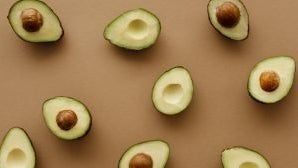
The Health Benefits Of Magnesium & The Best Supplements To Take
See how magnesium can help support health and performance....

Amino Acids: Benefits & Best Supplements To Take
Nutritionist answers all your amino acids questions....

Claire is a Registered Dietitian through the Academy of Nutrition and Dietetics and a board-certified Health and Wellness Coach through the International Consortium for Health and Wellness Coaching. She has a Bachelor of Science in Biology and a Master’s degree in Clinical Dietetics and Nutrition from the University of Pittsburgh.
Talking and writing about food and fitness is at the heart of Claire’s ethos as she loves to use her experience to help others meet their health and wellness goals.
Claire is also a certified indoor cycling instructor and loves the mental and physical boost she gets from regular runs and yoga classes. When she’s not keeping fit herself, she’s cheering on her hometown’s sports teams in Pittsburgh, or cooking for her family in the kitchen.
Find out more about Claire’s experience here.
1. Lodish, H., Berk, A., Zipursky, S. L., Matsudaira, P., Baltimore, D., & Darnell, J. (2000). Collagen: the fibrous proteins of the matrix. Molecular cell biology, 4.
2. Borumand, M., & Sibilla, S. (2014). Daily consumption of the collagen supplement Pure Gold Collagen® reduces visible signs of aging. Clinical interventions in aging, 9, 1747.
3. Plant, A. L., Bhadriraju, K., Spurlin, T. A., & Elliott, J. T. (2009). Cell response to matrix mechanics: focus on collagen. Biochimica Et Biophysica Acta (BBA)-Molecular Cell Research, 1793(5), 893-902.
4. Zdzieblik, D., Oesser, S., Baumstark, M. W., Gollhofer, A., & König, D. (2015). Collagen peptide supplementation in combination with resistance training improves body composition and increases muscle strength in elderly sarcopenic men: a randomised controlled trial. British Journal of Nutrition, 114(8), 1237-1245.
5. Proksch, E., Schunck, M., Zague, V., Segger, D., Degwert, J., & Oesser, S. (2014). Oral intake of specific bioactive collagen peptides reduces skin wrinkles and increases dermal matrix synthesis. Skin pharmacology and physiology, 27(3), 113-119.
6. Shaw, G., Lee-Barthel, A., Ross, M. L., Wang, B., & Baar, K. (2016). Vitamin C–enriched gelatin supplementation before intermittent activity augments collagen synthesis. The American journal of clinical nutrition, 105(1), 136-143.
7. Koutroubakis, I. E., Petinaki, E., Dimoulios, P., Vardas, E., Roussomoustakaki, M., Maniatis, A. N., & Kouroumalis, E. A. (2003). Serum laminin and collagen IV in inflammatory bowel disease. Journal of clinical pathology, 56(11), 817-820.
8. Maughan, R. J., Burke, L. M., Dvorak, J., Larson-Meyer, D. E., Peeling, P., Phillips, S. M., … & Meeusen, R. (2018). IOC consensus statement: dietary supplements and the high-performance athlete. International journal of sport nutrition and exercise metabolism, 28(2), 104-125.
9. Borumand, M., & Sibilla, S. (2014). Daily consumption of the collagen supplement Pure Gold Collagen® reduces visible signs of aging. Clinical interventions in aging, 9, 1747.
10. Hashim, P., Ridzwan, M. M., Bakar, J., & Hashim, M. D. (2015). Collagen in food and beverage industries. International Food Research Journal, 22(1), 1.
11. Maughan, R. J., Burke, L. M., Dvorak, J., Larson-Meyer, D. E., Peeling, P., Phillips, S. M., … & Meeusen, R. (2018). IOC consensus statement: dietary supplements and the high-performance athlete. International journal of sport nutrition and exercise metabolism, 28(2), 104-125.
12. Maia Campos, P. M., Melo, M. O., & Siqueira César, F. C. (2019). Topical application and oral supplementation of peptides in the improvement of skin viscoelasticity and density. Journal of cosmetic dermatology, 18(6), 1693-1699.
